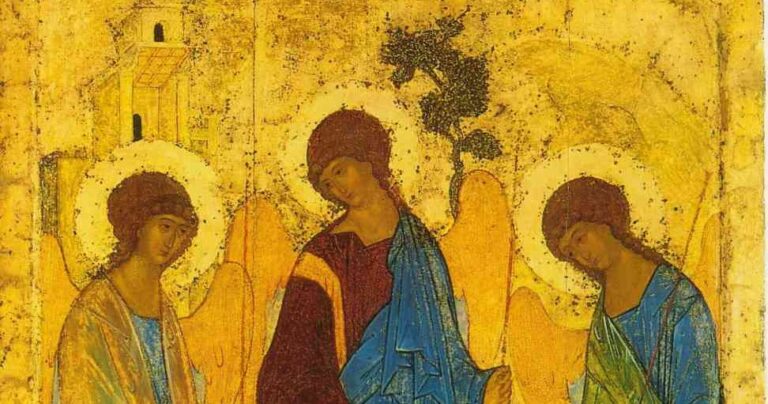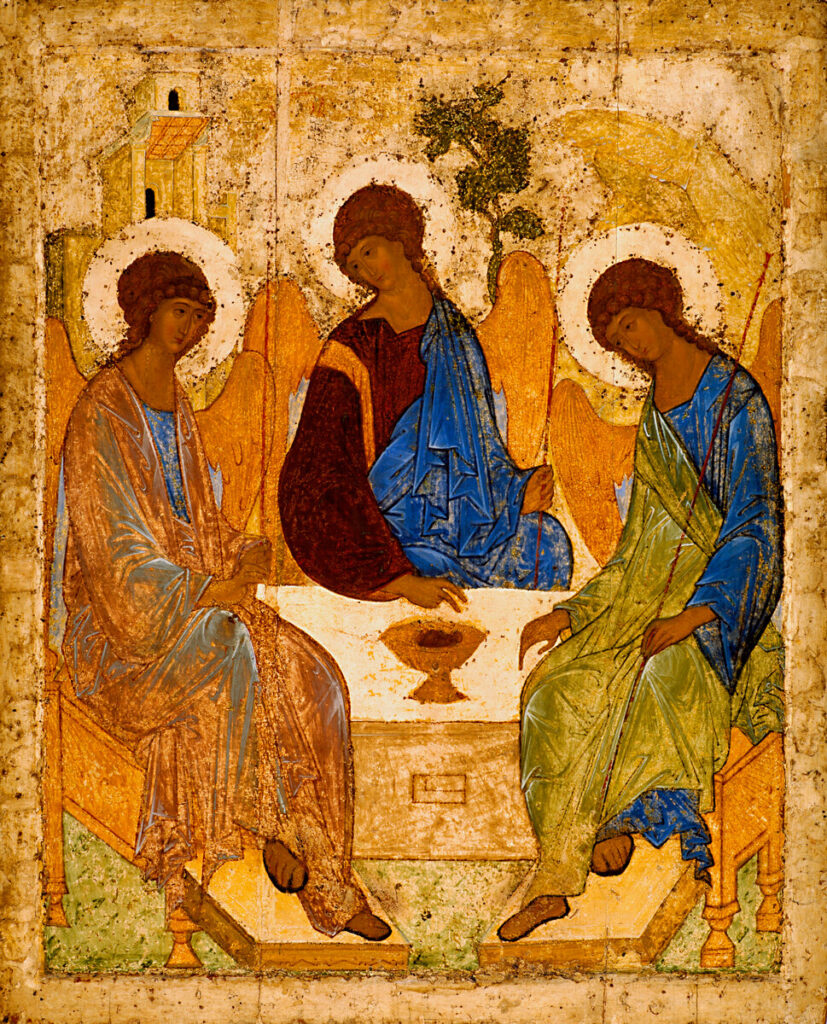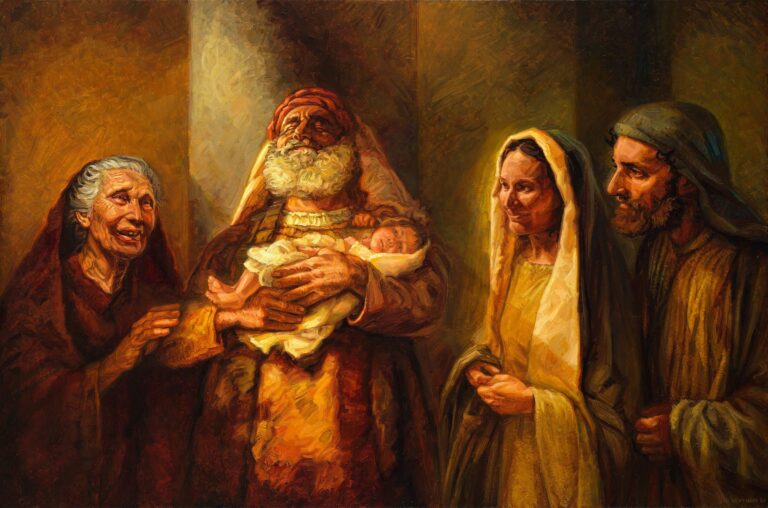| Chaplaincy
hospitality

Our reading is a great story which is very appropriate to Advent and connects to a very famous icon…
The Lord appeared to Abraham by the oaks of Mamre, as he sat at the entrance of his tent in the heat of the day. He looked up and saw three men standing near him. When he saw them, he ran from the tent entrance to meet them, and bowed down to the ground.
He said, ‘My lord, if I find favour with you, do not pass by your servant. Let a little water be brought, and wash your feet, and rest yourselves under the tree. Let me bring a little bread, that you may refresh yourselves, and after that you may pass on—since you have come to your servant.’
So they said, ‘Do as you have said.’ And Abraham hastened into the tent to Sarah, and said, ‘Make ready quickly three measures of choice flour, knead it, and make cakes.’ Abraham ran to the herd, and took a calf, tender and good, and gave it to the servant, who hastened to prepare it. Then he took curds and milk and the calf that he had prepared, and set it before them; and he stood by them under the tree while they ate.
They said to him, ‘Where is your wife Sarah?’ And he said, ‘There, in the tent.’ Then one said, ‘I will surely return to you in due season, and your wife Sarah shall have a son.’ And Sarah was listening at the tent entrance behind him. Now Abraham and Sarah were old, advanced in age; it had ceased to be with Sarah after the manner of women. So Sarah laughed to herself, saying, ‘After I have grown old, and my husband is old, shall I have pleasure?’ The Lord said to Abraham, ‘Why did Sarah laugh, and say, “Shall I indeed bear a child, now that I am old?” Is anything too wonderful for the Lord? At the set time I will return to you, in due season, and Sarah shall have a son.’
Then the men set out from there, and they looked towards Sodom; and Abraham went with them to set them on their way.
I love the detail of this story. You can imagine the scene – Abraham with the large tent for his family and servants, set up in place where he can graze his flock, maybe by an oasis as there is a tree nearby.
25 years ago I went on a trip to Israel, and driving through the hill country near Jerusalem, we went past Bedouin encampments – wide tents stretched across several poles, animals outside – but now with a 4×4 and a water tanker outside.
So Abraham is sitting in the shade of the open tent in the heat of the day when three strangers appear. Abraham then does what is demanded by Middle Eastern traditions of hospitality. He runs to meet them, bowing low. He begs them to stay, to wash their feet, to rest under the tree. He says that he will bring them a little bread – but as is the way of such hospitable people, he actually arranges a feast – flatbread cakes, curds and milk – maybe like yoghurt – with some meat.
He stands by them to serve them as they eat. And then the tables are turned. They have a gift for him – a promise which reaffirms the promise he has already been given, that he will be the father of many nations, but in a more intimate way – his wife will bear a son.
This story prefigures the story that we are soon to celebrate. God breaks into the lives of people unexpectedly and mysteriously. There will be a birth which seems miraculous – Sarah was past the age of bearing children. She cannot believe it. Mary, later, will say ‘how can this be’ – although her response is a more trusting one than Sarah’s.
The setting would have been very familiar to those listening to the story – perhaps round a campfire in front of another tent. The welcome, the hospitality, the meal, Abraham going with the men to send them on their way. It is in the ordinary situations of our lives that God comes to meet us.

This famous icon by a Russian iconographer called Rublev pictures this story. Rublev had not been to the Middle East and he doesn’t picture the story literally. This is often taken as a picture of the Trinity – the endless relationship of love between God as Father, Son and Spirit.
But I think it is also about hospitality. Something interesting is happening with the perspective. We are invited in to sit at the table and join those sitting round it. It reminds me of a prayer I wrote a long time ago, thinking about the poem by George Herbert which begins ‘Love bade me welcome’ – and about the communion table which we are sitting around now:
The Lord Jesus invites us to this meal.
When our shame makes us draw back, his love bids us welcome.
He lifts our downcast eyes to his.
He takes our hand and draws us in.
He says, ‘Because of me, you are the worthy guest.’
Our Lord, we come with thankful hearts.’
There is a lovely reciprocity – as we welcome the coming of Jesus among us, so he welcomes us. We are drawn into the eternal open circle of God’s love – and he comes to be with us in the ordinary places of our lives. And we know his presence especially as we meet to share communion, welcomed by his love.
As you bring all of this into prayer, call to mind your ‘ordinary’ life, may be busy, maybe stressful or challenging…
Lord, help us to make space to greet you and welcome you once again – to share our everyday lives with you – to offer ourselves, and to wait for all that you bring to us.
You may like to look now at the image of the icon.
Lord, your love is always reaching out to welcome us. Draw us deeper into the circles of your life.



